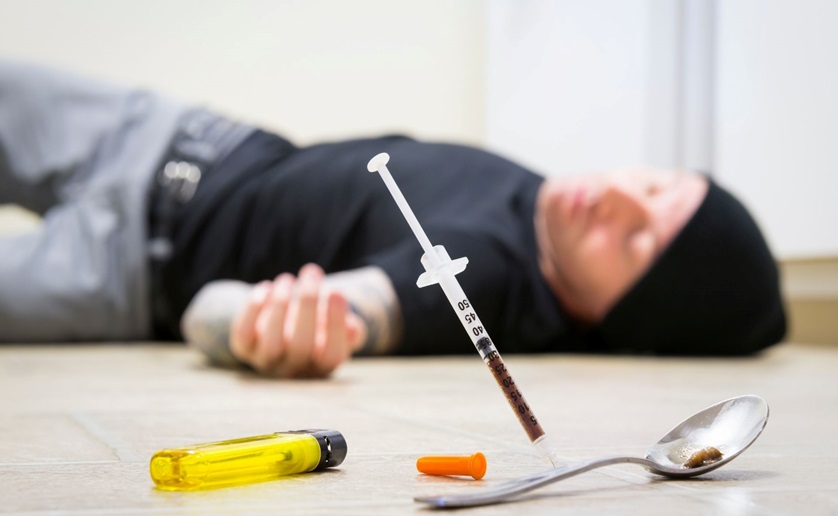Heroin is a highly addictive drug, and, in some cases, it can be lethal. This article will provide information on heroin overdose.
What happens during a heroin overdose?
Heroin, a powerful narcotic, is one of the most addictive drugs that you can try. The drug binds to the body’s opiate receptors causing the person using it to feel euphoric as well as drowsy and lightheaded. Over time, heroin use becomes more frequent, and the user finds himself/herself unable to function without the drug.
Because of this, heroin overdose is a very common occurrence among people who are addicted to it. In fact, statistics show that those who frequently use heroin are 4 times more likely than non-users to experience an accidental death from overdosing on the drug.
Heroin overdose symptoms vary but may include:
- Pinpoint pupils-small, constricted pupils, which can occur across the entire eye or just in the center of your eye.
- Unconsciousness (A person who overdoses on heroin is unresponsive and limp)
- Slow or shallow breathing (Unable to breathe properly)
- Convulsions (the body jerking suddenly) – a person overdosing on heroin is usually not convulsing when this happens, but they may be sweating profusely.
- Confusion or disorientation-slurred speech and difficulty walking
- Inability to communicate normally (in combination with other heroin symptoms)
- Slow heartbeat and low blood pressure
- Very small pupils
- Snoring in an unconscious person
How long does it take to overdose on heroin?
According to a heroin addiction podcast, as heroin has a very strong sedative effect, along with the fact that it’s being injected directly into the bloodstream (as opposed to being taken orally via pills), overdosing on heroin does not take long – just 2 doses. While this is definitely something that any drug user should be concerned about, rest assured that there are many measures that can be taken to prevent yourself from overdosing on heroin.
What To Do for Heroin Overdose?
If you witness somebody suffering from a heroin overdose, then immediately call 911 or your local emergency ambulance number. If you are with the person when he/she collapses or is found unconscious on the bathroom floor, do not try to give them mouth-to-mouth resuscitation or apply any other first aid techniques. Instead, call the emergency number and then wait for the ambulance to reach you.
- Try To Keep an Overdose Victim Calm
The victim needs to remain calm while waiting for the ambulance to arrive. In a state of panic or anxiety, heroin overdose victims may exhibit erratic breathing patterns that can trigger irregular heartbeat, making it harder for the heart to pump blood. If an overdose victim is conscious, try to make him or her lie down with their feet slightly elevated and covered in a blanket.
- Leave The Overdose Victim Alone
Heroin overdose victims must be left alone once they are fully unconscious; any physical attempts at reviving them (such as mouth-to-mouth resuscitation) may worsen the effect of a heroin overdose.
- Try To Keep the Heroin Overdose Victim Hydrated
Understanding that a person may not be responsive or aware of their surroundings, you should try to keep them hydrated by providing them with small quantities of water/fluids in their mouth. In addition, if the victim is unconscious, you should try to wash their face with water regularly in order to prevent it from drying up and minimize any risk of infection.
- Try To Make the Overdose Victim Throw-Up
Once he/she has been to the hospital and treated, heroin overdose victims can be kept conscious by making them throw up. This is done by placing the victim in a seated position (with his/her back against something, such as a wall or headboard), with his/her head slightly tilted back over the edge of a bed, couch, or chair.
- Try To Make Heroin Overdose Victim Start Breathing Normally
If you are not sure that an overdose victim has been properly resuscitated, keep him or her in a lying position while moving his/her legs back and forth to stimulate breathing. Follow this up with 30 chest compressions (where the heroin overdose victim’s breastbone is depressed several inches) along with two breaths into their mouth, which should be performed with the help of an assistant pushing down on the person’s chest.
Emergency treatments for heroin overdose:
- Inject Heroin Overdose Victims with Naloxone
Naloxone is a narcotic antagonist that counteracts the effects of a heroin overdose. This drug acts by causing an immediate reversal of an overdose without producing additional side effects, unlike other medications which may have to be administered repeatedly (such as Narcan).
- Perform CPR to Bring Heroin Overdose Victims Back to Consciousness
Since naloxone does not reverse all of the effects of a heroin overdose, it is still possible that a person who has been administered this drug may be in an unconscious state. In such cases, you should perform regular CPR (30 chest compressions along with 2 breaths into the victim’s mouth) to revive them.
How Long Does it take to Detox from Heroin and get off for good?
The number of months you’ll need to sober up depends on a lot of factors. Age, genetics, and the type of heroin addiction you have all play roles in determining how long it takes to overcome heroin addiction.
The opioid epidemic is a public health crisis. It has touched many lives, and the medical community needs to do more work in order to help those struggling with addiction. If you or someone you know are experiencing an overdose from heroin, take steps today that will help protect your life tomorrow!

